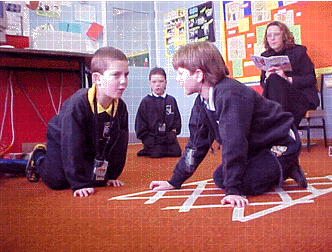Pre-School Education
The Language Experience Group and Playgroup
In 1993 this group was extended to include deaf children from the age of diagnosis, hearing siblings and CODAS (each of these latter two groups having identifiable needs of their own which were not being met). By this time the level of Auslan skills of the deaf children within the school population had improved considerably and were usually age appropriate, so children were only withdrawn from the classroom to attend if their skills remained considerably delayed.
Extending the scope of the group has caused difficulties with such a wide range of developmental social, emotional and language skills and it has become increasingly impossible to successfully meet the needs of all the children within the group. The most significant difficulty has been the conflict between providing an Auslan only environment and the right of small hearing children to use English as and when they wish. For practical reasons, the group was held concurrently with Parent Signing class so it also had a child care component.
Thus, at the end of 1999, this group will cease, to be replaced by a child care only facility held during Parent Signing so parents are free to attend their class and a Deaf Playgroup held at a different time so parents and children can attend together. It is anticipated that this group will include Deaf parents with their hearing children, and hearing parents with both deaf and hearing children, from birth to school age, as parents see fit. The Claremont Project will employ an experienced Playgroup coordinator, a Deaf adult and nominate one teacher of the deaf to attend. It is anticipated that the Playgroup will join the Playgroup Association and be run along the same lines as other Playgroups with parents controlling and running the group. It is to be hoped that this will give natural and comfortable opportunities for Deaf and hearing parents and children to mix and communicate together, developing a range of skills in a non-threatening environment. If possible the Playgroup will run concurrently with other Playgroups in the school so that all the children and parents moving on to Kindergarten the following year can get to know each other through some shared activities.
Want more information?
Primary Education
Auslan as a L.O.T.E
(Language Other Than English)
The Language Experience Group and Playgroup
The (ETA) English Through Auslan Group
This group started in 1992 to address the language needs of young deaf children in school who did not yet have age appropriate Auslan (L1) skills. This was seriously affecting their ability to learn English (L2) through literacy. The children were withdrawn from the classroom as a group to develop their Auslan skills in a 'natural', play environment. For example, the whole room could be turned over to be a shop and the children could practise all the appropriate, related language skills as shoppers and shopkeepers. Excursions into the community were common and provided excellent opportunities for further language learning. In this group there was no attempt to teach language, but rather have it modelled by native Auslan users in an Auslan only, immersion style environment. the group was also an opportunity for social and cultural modelling by Deaf adults.

Contact us
